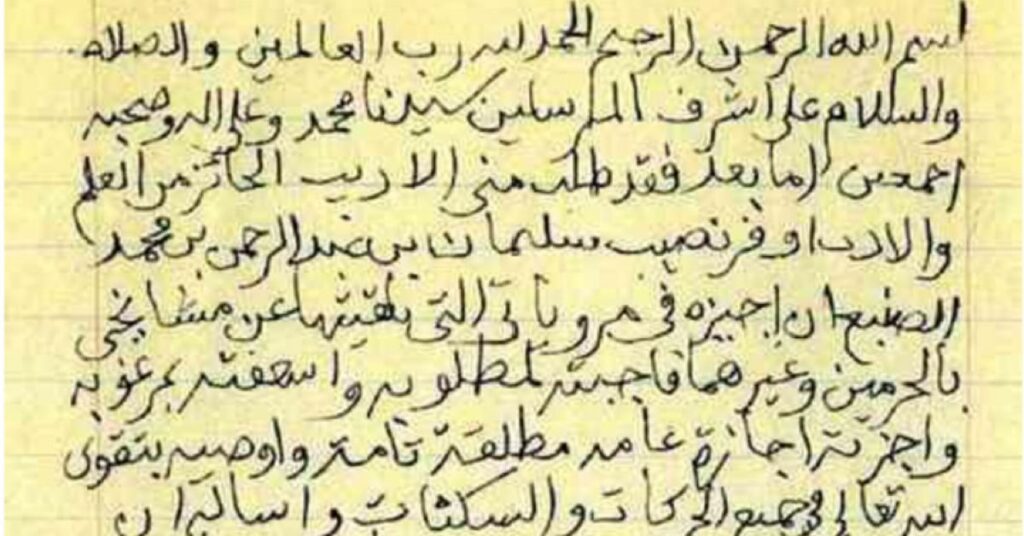In recent years, there has been a resurgence in the samāʿ tradition (transmission of ḥadīth recital), and a growing interest in the knowledge of ilm al-riwāyah, spreading widely. Additionally, numerous forms of communication have emerged, facilitating students’ exploration of Ḥadīth studies. It is crucial for students of riwāyah to discern between valid and invalid transmission methods. Furthermore, one must delve into the relevant rules of this field to avoid ignorance concerning the various types of transmissions. Among the trustworthy and legitimate transmission methods is ijāzah bi al-wakālah. However, due to the challenge of distinguishing between ijāzah riwāyah and ijāzah ʿilmiyyah or shahādah ʿilmiyyah, some individuals find this form of transmission to be perplexing and erroneous.
In this article, we will explore the definition and scholarly discourse surrounding this type of ijāzah.
Introduction:
Within the realm of scholarship, ‘wakālah bi al-ijāzah’ is a practice in which a scholar designates a representative to grant ijāzah on their behalf. This decision often arises from factors such as the scholar’s high demand, busy schedule, age, or other constraints, making it challenging for them to personally grant ijāzah to all students. In such cases, a representative, known as a ‘wakīl,’ steps in to directly issue ijāzah to students, thereby enabling these students to narrate directly from the scholar.
Scholarly Discussion:
Imām al-Zarkashī (d. 794 AH) was the first to introduce it as a distinct category among various forms of ijāzah. He called it ‘al-idhn bi al-ijāzah,’ where someone says, ‘I authorise you to grant ijāzah on my behalf.'[1]قال الإمام الزركشي: وبقي من الأنواع التي لم يذكرها المصنف – أي: ابن الصلاح – الإذن في الإجازة، مثل أن … المزيد
Imām al-Sakhāwī (d. 902 AH) mentioned it under the topic of ‘al-ijāzah al-muʿallaqah bi mashī’ah al-ghayr’ (ijāzah dependent on the will of others).[2]قال الإمام السخاوي: وهل يلتحق بالتعليق بمشيئة المعين الإذن له في الإجازة، كأن يقول: أذنت لك أن تجيز عنّي من … المزيد
Those who have mentioned this form of ijāzah do not differ regarding its validity.
Scholarly Practice:
Here is a list of scholars who appointed wukalā’ (pl. wakīl) to grant ijāzah on their behalf to others:
1. Imām Ibrāhīm ibn Khalaf ibn Manṣūr al-Ghassānī (d. around 620 AH). Imām Abū Bakr Ibn Masdī (d. 663 AH) stated: ‘He (Ibrāhīm) held wakālah for ijāzah from various scholars and granted ijāzah to anyone who wished to narrate from them. He granted me ijāzah on his behalf and also from those who had appointed him as their wakīl (representative) in the year 603.’[3]قال الإمام ابن حجر في ترجمة إبراهيم بن خلف بن منصور الغساني: قال ابن مَسْدي، كانت له وكالات بالإجازة من شيوخ … المزيد
2. Khalīfah al-Nāṣir li al-Dīn Allāh Aḥmad ibn al-Ḥasan ibn Yūsuf al-ʿAbbās (d. 622 AH). He had a strong interest in Ḥadīth narration and appointed a wakīl for ijāzah because it was not possible for any student to approach the Khalīfah directly and obtain an ijāzah from him.[4]قال الإمام الذهبي في ترجمة الخليفة الناصر لدين الله (١٣١): قال الموفق عبد اللطيف: وفي ولايته اشتغل برواية … المزيد
3. Imām Abū Bakr Muḥammad ibn Yūsuf ibn Masdī al-Azdī (d. 663 AH).[5](لسان الميزان، ٢٧٥:١، الشيخ أبو غدة).
4. Imām Ibn Ḥajar al-ʿAsqalānī (852 AH). According to his student, Imām al-Sakhāwī (902 AH), after discussing this topic, he mentioned, ‘Our Shaykh (Ibn Ḥajar) did this.’[6]قال الإمام السخاوي عقب كلامه عن التوكيل بالإجازة: وقد فعله شيخنا. (فتح المغيث للإمام السخاوي، ٤٣١،٣٣٢:٢، دار … المزيد
Scholars from recent times:
- Shaykh Muḥammad Badr al-Dīn al-Ḥasanī (d. 1354 AH)[7](علم رواية الحديث، ٤٧٣-٤٧٥).
- Shaykh ʿUbaydullāh al-Sindī al-Deobandī (d. 1363 AH)[8]الإجازات الهندية: ١٣٢.
- Shaykh ʿUmar Ḥamdān al-Maḥrasī (d. 1368 AH)
- Shaykh al-Sharīf ʿAbd al-Ḥayy al-Kettānī (d. 1382 AH)
Some Contemporary Senior Musnids:
- Shaykh al-Sharīf ʿAbd al-Raḥmān ibn ʿAbd al-Ḥayy al-Kettānī (d. 1444 AH)
- Shaykh Muḥammad ibn Abū Bakr al-Ḥibshī.
- Shaykh Muftī Walī al-Ḥaqq al-Ṣadīqī al-Afghānī.
- Shaykh Nūr al-Dīn al-Khaṭīb al-Dimashqī.
- Shaykh Qāsim ibn Ibrāhīm al-Baḥr.
- Shaykh al-Sharīf al-Qāḍī Karīmullāh Khān.
Basis for Permissibility:
Firstly, scholars have drawn parallels with wakālah of buyūʿ (buying and selling), as this is permissible, and so should wakālah of ijāzah be. Imām al-Zarkashī (d. 794 AH) commented that this form of ijāzah is valid.[9]قال الإمام الزركشي: والظاهر فيه الصحة، كما لو قال : وكَّل عني، ويكون مجازا من جهة الإذن، وينعزل المأذون له في … المزيد
Secondly, there is an analogy with ‘mukātabah’ written correspondence, where it is permissible for someone else to write on behalf of another. Likewise, it is permissible for someone else to grant wakālah of ijāzah to another.
Miscellaneous Rules:
- It’s crucial to understand that wakālah bi al-ijāzah adheres to the principles of conventional Fiqhī wakālah in two regards:
1. Initially, the scholar bestowing the wakālah for ijāzah retains the authority to withdraw it, similar to standard wakālah practices. However, in the context of wakālah for ijāzah, should the issuer of ijāzah (the scholar) decide to revoke it, the existing wakālah for ijāzah remains unaffected.
2. Secondly, according to the consensus of Islamic jurists, standard wakālah terminates upon the death of the authoriser. Consequently, wakālah bi al-ijāzah will also cease to be in effect after the authoriser’s passing. Therefore, if the wakīl bi al-ijāzah grants an ijāzah after it has been revoked or following the authoriser’s death, the ijāzah is considered invalid. This was exemplified in the case of Shaykh Muḥammad Badr al-Dīn al-Ḥasanī (d. 1354 AH), who authorised his student Muḥammad Yaḥyā ibn Aḥmad al-Maktabī (d. 1378 AH) to issue it to interested students of knowledge during his lifetime, which was permissible. However, he continued to grant ijāzah after the Shaykh’s demise, mistakenly believing it was still valid, and many students received ijāzah from him. In this instance, the ijāzah is deemed invalid due to the termination of wakālah following the Shaykh’s death.[10](علم رواية الحديث، ٤٧٣-٤٧٥).
- Documentation of the wakālah or any ijāzah is recommended as a means of providing evidence. In some instances, scholars granting wakālah have declined to do so, due to advanced age or other factors.
- When seeking wakālah, it’s crucial that the scholar from whom you are requesting it has a clear understanding of its distinct nature and does not mistake it for a regular ijāzah or an ijāzah for teaching purposes.
The Wakālah of Shaykh al-Sharīf al-Qāḍī Karīmullāh Khān (ḥafiẓaullāh)
Shaykh al-Qāḍī Karīmullāh, among the most esteemed scholars in the UK, and perhaps the most senior, counted among the final students of the late Grand Muftī Kafāyatullāh (d. 1372 AH), and quite possibly the last, was unable to grant ijāzah personally to every seeker due to his advanced age and illness. Nevertheless, through the grace and mercy of Allāh ﷻ, the beloved shaykh delegated wakālah to his son, Shaykh al-Sharīf Riḍwān, and Shaykh ʿĀmir, both of whom derived immense benefit from the shaykh’s teachings.
In conclusion, the ‘wakālah bi al-ijāzah’ tradition is a valid and reliable form of Ḥadīth transmission. Despite the challenges and complexities involved in this practice, scholars and students continue to navigate its intricacies.
As we reflect on the legacy of scholars like Shaykh al-Qāḍī Karīmullāh, who found innovative ways to ensure the continuity of knowledge, we are reminded of the resilience of scholarly traditions. In the face of age and illness, the delegation of wakālah stands as a testament to the unwavering dedication to the transmission of wisdom.
May this tradition continue to bridge the gap between scholars and seekers of knowledge, fostering a vibrant and enduring scholarly community for generations to come. Āmīn
From the insights of scholars, such as our beloved teacher, Shaykh Mohammad Daniel, the founder of Cordoba Academy.[11]علم رواية الحديث، ٤٧٣-٤٧٥، ومنح المنة: ٦٩.
Mawlānā Nadim Hussain
Muḥaddithūn granting ijāzah bi al-wakālah to their students
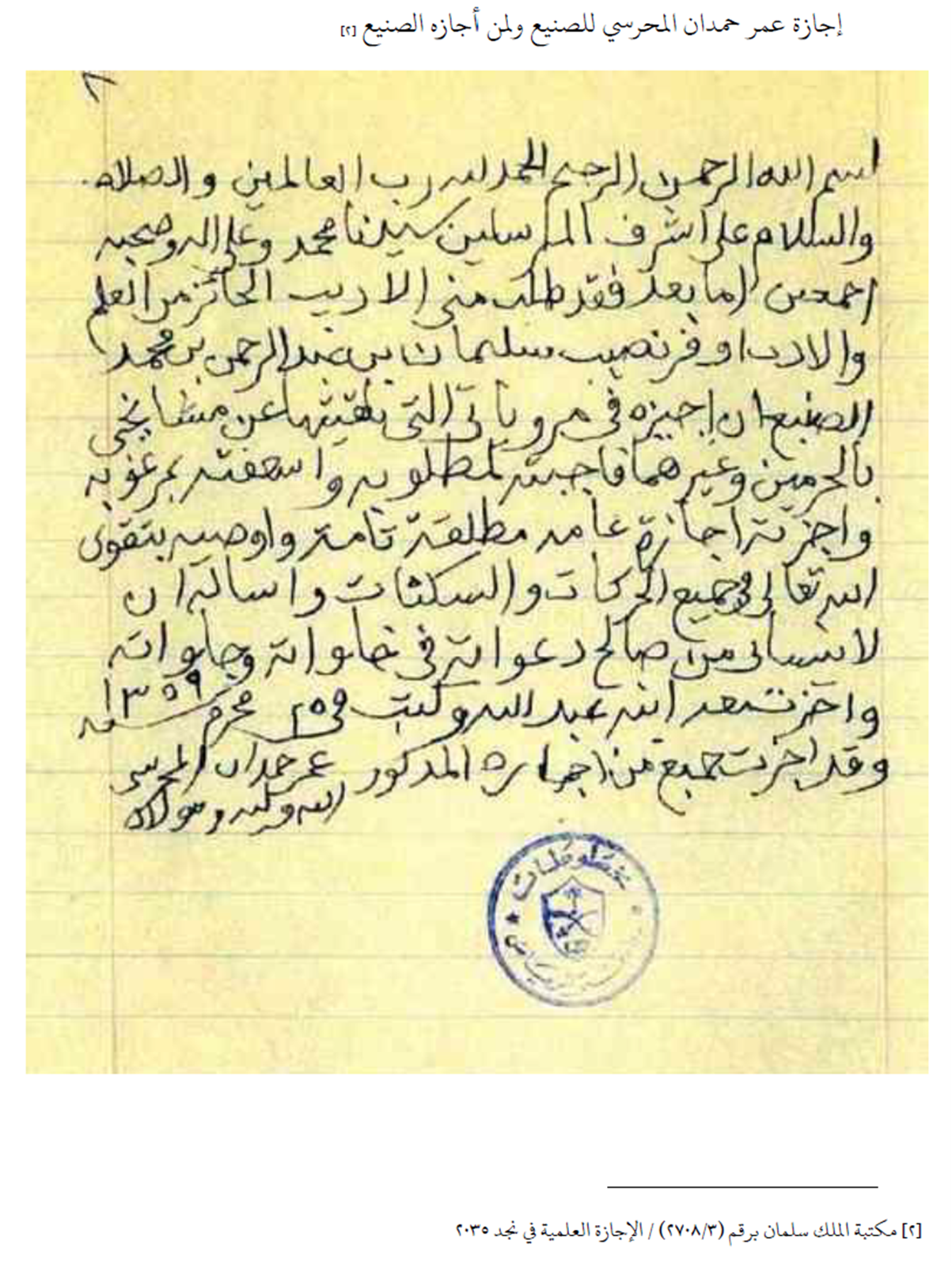
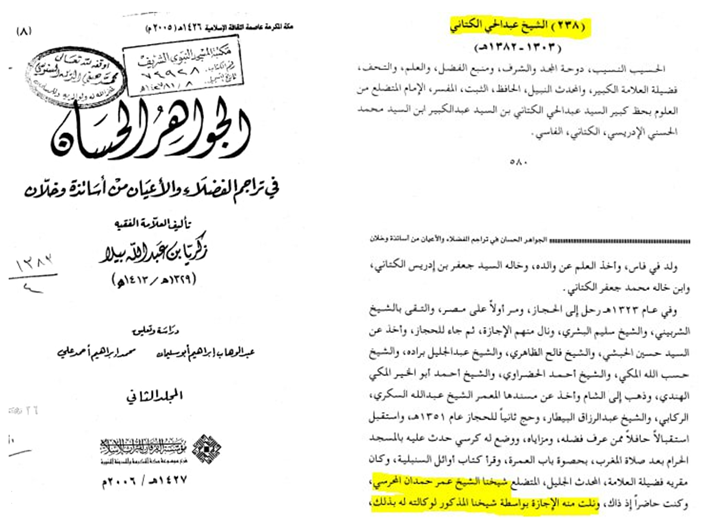
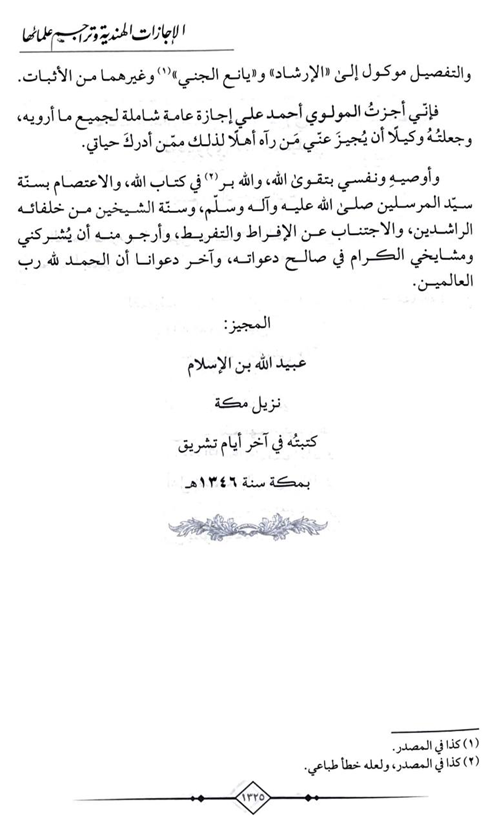
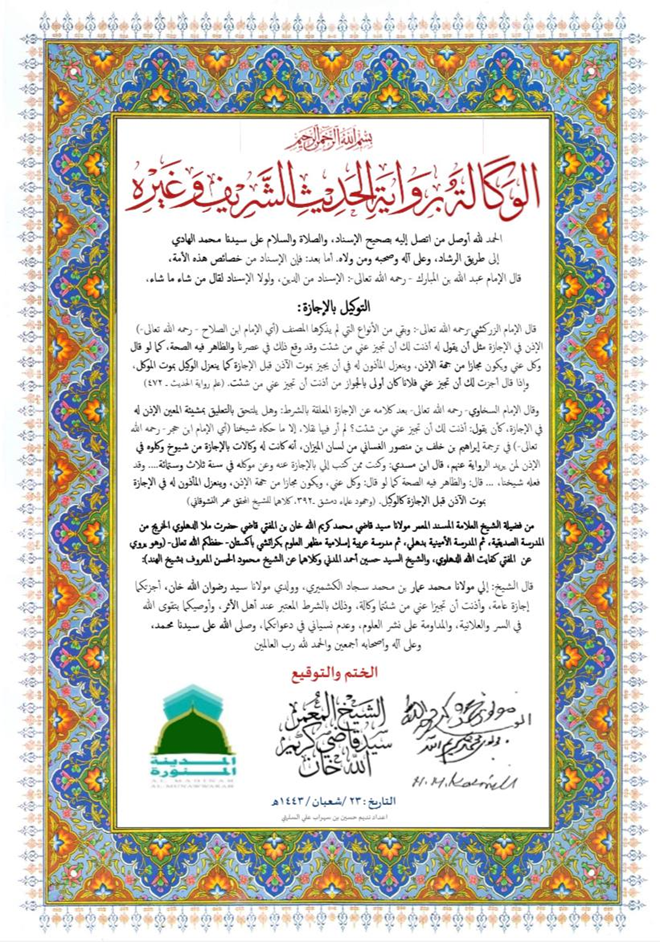
الحاشية[+]
| ↑1 | قال الإمام الزركشي: وبقي من الأنواع التي لم يذكرها المصنف – أي: ابن الصلاح – الإذن في الإجازة، مثل أن يقول له: أذنتُ لك أن تجيز عني من شئتَ، وقد وقع ذلك في عصرنا. (النكت، ٥٢٦:٢، ت: الشيخ زين العابدين). |
|---|---|
| ↑2 | قال الإمام السخاوي: وهل يلتحق بالتعليق بمشيئة المعين الإذن له في الإجازة، كأن يقول: أذنت لك أن تجيز عنّي من شئت… (فتح المغيث: ٤٣١،٣٣٢:٢، دار المناهج). |
| ↑3 | قال الإمام ابن حجر في ترجمة إبراهيم بن خلف بن منصور الغساني: قال ابن مَسْدي، كانت له وكالات بالإجازة من شيوخ وكلوه على الإذن لمن يريد الرواية عنهم، فكتب لي بالإجازة عنه وعن موكليه في سنة ثلاث وست مئة. (لسان الميزان، ٢٧٥:١، الشيخ أبو غدة). |
| ↑4 | قال الإمام الذهبي في ترجمة الخليفة الناصر لدين الله (١٣١): قال الموفق عبد اللطيف: وفي ولايته اشتغل برواية الحديث… ثم جُعِلَ وكيلًا عن الناصر في الإجازة والتسميع. (سير أعلام النبلاء، ٢٢: ١٩٧، مؤسسة الرسالة). |
| ↑5 | (لسان الميزان، ٢٧٥:١، الشيخ أبو غدة). |
| ↑6 | قال الإمام السخاوي عقب كلامه عن التوكيل بالإجازة: وقد فعله شيخنا. (فتح المغيث للإمام السخاوي، ٤٣١،٣٣٢:٢، دار المناهج). |
| ↑7 | (علم رواية الحديث، ٤٧٣-٤٧٥). |
| ↑8 | الإجازات الهندية: ١٣٢. |
| ↑9 | قال الإمام الزركشي: والظاهر فيه الصحة، كما لو قال : وكَّل عني، ويكون مجازا من جهة الإذن، وينعزل المأذون له في أن يجيز بموت الآذن قبل الإجازة، كما ينعزل الوكيل بموت الموكل. (النكت للإمام الزركشي، ٥٢٦:٢، ت: الشيخ زين العابدين). |
| ↑10 | (علم رواية الحديث، ٤٧٣-٤٧٥). |
| ↑11 | علم رواية الحديث، ٤٧٣-٤٧٥، ومنح المنة: ٦٩. |

